Garbage sorting and recycling-垃圾分类与回收汇编
垃圾分类的内容怎么写英语版
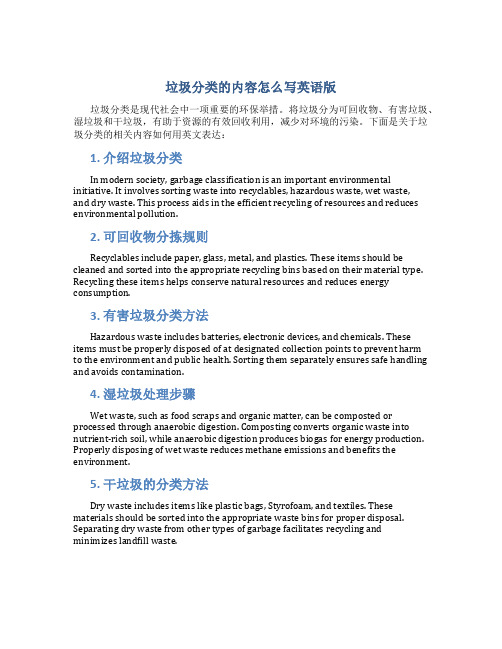
垃圾分类的内容怎么写英语版垃圾分类是现代社会中一项重要的环保举措。
将垃圾分为可回收物、有害垃圾、湿垃圾和干垃圾,有助于资源的有效回收利用,减少对环境的污染。
下面是关于垃圾分类的相关内容如何用英文表达:1. 介绍垃圾分类In modern society, garbage classification is an important environmental initiative. It involves sorting waste into recyclables, hazardous waste, wet waste,and dry waste. This process aids in the efficient recycling of resources and reduces environmental pollution.2. 可回收物分拣规则Recyclables include paper, glass, metal, and plastics. These items should be cleaned and sorted into the appropriate recycling bins based on their material type. Recycling these items helps conserve natural resources and reduces energy consumption.3. 有害垃圾分类方法Hazardous waste includes batteries, electronic devices, and chemicals. These items must be properly disposed of at designated collection points to prevent harmto the environment and public health. Sorting them separately ensures safe handling and avoids contamination.4. 湿垃圾处理步骤Wet waste, such as food scraps and organic matter, can be composted or processed through anaerobic digestion. Composting converts organic waste into nutrient-rich soil, while anaerobic digestion produces biogas for energy production. Properly disposing of wet waste reduces methane emissions and benefits the environment.5. 干垃圾的分类方法Dry waste includes items like plastic bags, Styrofoam, and textiles. These materials should be sorted into the appropriate waste bins for proper disposal. Separating dry waste from other types of garbage facilitates recycling and minimizes landfill waste.结论In conclusion, garbage classification plays a vital role in environmental protection and resource conservation. By following the guidelines for sorting recyclables, hazardous waste, wet waste, and dry waste, individuals can contribute to a cleaner and more sustainable environment. Promoting awareness of garbage classification practices is essential for fostering a culture of responsible waste management and sustainable development.。
与垃圾分类相关的英语单词及短语
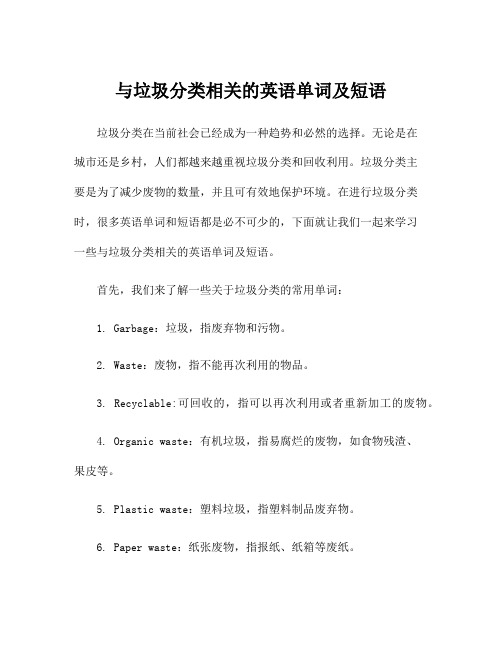
与垃圾分类相关的英语单词及短语垃圾分类在当前社会已经成为一种趋势和必然的选择。
无论是在城市还是乡村,人们都越来越重视垃圾分类和回收利用。
垃圾分类主要是为了减少废物的数量,并且可有效地保护环境。
在进行垃圾分类时,很多英语单词和短语都是必不可少的,下面就让我们一起来学习一些与垃圾分类相关的英语单词及短语。
首先,我们来了解一些关于垃圾分类的常用单词:1. Garbage:垃圾,指废弃物和污物。
2. Waste:废物,指不能再次利用的物品。
3. Recyclable:可回收的,指可以再次利用或者重新加工的废物。
4. Organic waste:有机垃圾,指易腐烂的废物,如食物残渣、果皮等。
5. Plastic waste:塑料垃圾,指塑料制品废弃物。
6. Paper waste:纸张废物,指报纸、纸箱等废纸。
7. Glass waste:玻璃废物,指玻璃制品废弃物。
8. Hazardous waste:危险废物,指对人类和环境有危害的废弃物。
9. Landfill:填埋场,指专门用于垃圾填埋的场地。
10. Composting:堆肥,指利用有机垃圾等进行自然分解产生有机肥料。
其次,我们来了解一些与垃圾分类相关的常用短语:1. Garbage sorting:垃圾分类,指将不同种类的垃圾进行分类。
2. Recycling program:回收项目,指用于收集和回收可再生资源的计划。
3. Waste segregation:废物分离,指将废物分开以便于回收利用。
4. Environmental protection:环境保护,指通过各种措施保护和改善自然环境。
5. Reduce, reuse, recycle:减少、重复利用、回收,指环保口号,号召人们减少废物、重复利用和回收利用资源。
6. Green living:绿色生活,指倡导环保、低碳、低能耗的生活方式。
7. Waste management:废物管理,指对废物进行有效的处理和利用。
Garbagesortingandrecycling垃圾分类与回收
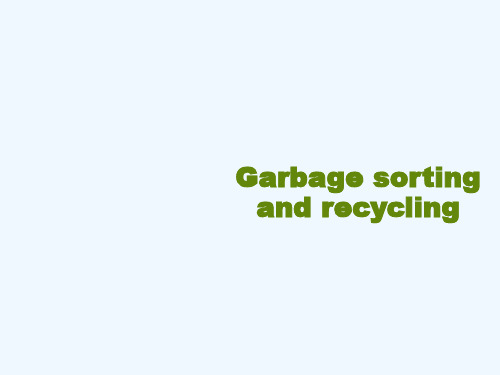
Garbage recycling
• Recycling is important and has became a key component in
waste management. Most cities and towns have some type of recycling center. They can freely put their recyclable materials out for collection. In many places this is done free of charge. The only thing a person has to do is separate out their recyclable waste and make sure to put it in the recycling bin for collection.
big positive impact on the environment.
For beautiful future, come on !!!
• Although garbage sorting may take you a little more time, we can
save our natural resources to a large extent and by doing so, we are also setting a good example to our younger generation.
Garbage sorting and recycling
• Today the quality of our natural e issue. The world population is rising so quickly that the world has become too crowded. We are using up our natural resources and at the same time polluting our environment with dangerous chemicals. If we continue to do this, life on earth cannot survive.
垃圾回收分组的英语作文

Garbage Sorting and Recycling: A Call forActionIn the modern era, waste management has become a pressing concern for both developed and developing nations alike. The problem of garbage accumulation and its subsequent impact on the environment cannot be ignored any longer. One effective solution to this problem is the implementation of garbage sorting and recycling programs. These programs aim to reduce waste, conserve resources, and protect the environment by separating and recycling various types of waste.The benefits of garbage sorting and recycling are numerous. Firstly, it helps to reduce the amount of waste that ends up in landfills, thereby reducing the amount of land required for waste disposal. Secondly, recycling reduces the demand for new raw materials, conservingnatural resources and reducing the environmental impact of mining and extraction activities. Additionally, recycling creates jobs and stimulates economic growth by providing opportunities for waste collection, sorting, and processing.To ensure the success of garbage sorting and recycling programs, it is crucial to involve the community at all levels. Education and awareness-raising campaigns are essential to inform people about the importance of garbage sorting and recycling, and to encourage them to participate actively in these programs. Governments and private sector organizations should collaborate to implement effective waste management policies and provide the necessary infrastructure and facilities for garbage sorting and recycling.Moreover, innovative technologies and approaches can be employed to enhance the efficiency of garbage sorting and recycling processes. For instance, the use of smart bins and sensors can automate the sorting process, reducing human error and increasing efficiency. Additionally, the development of new recycling technologies can improve the quality and quantity of recycled materials, making them more suitable for reuse in manufacturing processes.In conclusion, garbage sorting and recycling arecrucial for sustainable waste management and environmental protection. By involving the community, implementingeffective policies, and harnessing innovative technologies, we can turn waste into a valuable resource and contribute to a cleaner, greener, and more sustainable future for all. **垃圾回收分组:行动的呼唤**在现代社会,垃圾管理已成为发达国家和发展中国家共同面临的重要问题。
垃圾分类保护环境英语作文倡议书
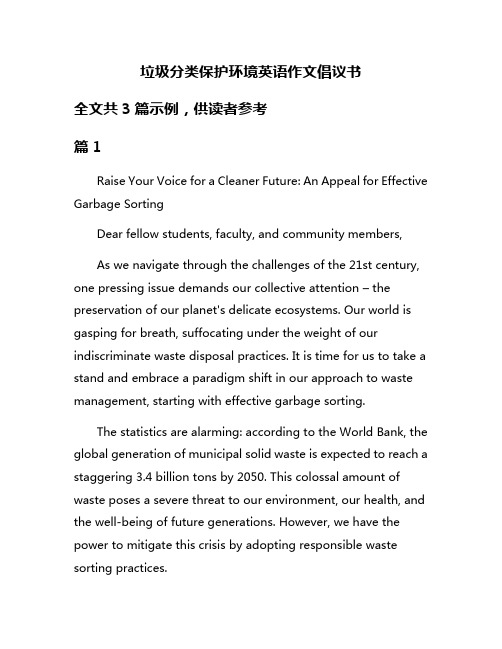
垃圾分类保护环境英语作文倡议书全文共3篇示例,供读者参考篇1Raise Your Voice for a Cleaner Future: An Appeal for Effective Garbage SortingDear fellow students, faculty, and community members,As we navigate through the challenges of the 21st century, one pressing issue demands our collective attention – the preservation of our planet's delicate ecosystems. Our world is gasping for breath, suffocating under the weight of our indiscriminate waste disposal practices. It is time for us to take a stand and embrace a paradigm shift in our approach to waste management, starting with effective garbage sorting.The statistics are alarming: according to the World Bank, the global generation of municipal solid waste is expected to reach a staggering 3.4 billion tons by 2050. This colossal amount of waste poses a severe threat to our environment, our health, and the well-being of future generations. However, we have the power to mitigate this crisis by adopting responsible waste sorting practices.Garbage sorting is not merely a buzzword; it is a revolutionary concept that holds the key to unlocking a sustainable future. By separating our waste into distinct categories, such as recyclables, organics, and non-recyclables, we can significantly reduce the strain on our landfills and incinerators. This simple act has far-reaching implications, from preserving natural resources to minimizing greenhouse gas emissions.Imagine a world where our recyclable materials are given a second life, transformed into new products instead of languishing in landfills. Envision thriving ecosystems, where biodegradable waste is composted and nourishes the soil, providing sustenance for countless organisms. Picture cleaner air and water, free from the toxic pollutants that plague our planet. This vision can become a reality through our collective commitment to garbage sorting.But why should we, as students, care about this issue? The answer is simple: we are the torchbearers of tomorrow. The decisions we make today will shape the world we inherit. By embracing garbage sorting, we can cultivate a culture of environmental stewardship that will resonate throughout our lives and inspire generations to come.Furthermore, our academic institutions play a pivotal role in shaping the minds of future leaders and decision-makers. By implementing comprehensive garbage sorting programs on campus, we can foster a sense of environmental responsibility and lead by example. Imagine the impact we could have if every classroom, dormitory, and cafeteria embraced this practice – a ripple effect that could inspire change far beyond our campus boundaries.However, our efforts should not be confined to our institutions alone. We must extend our reach into our communities, rallying support and encouraging households, businesses, and local governments to join us in this crucial endeavor. Together, we can create a groundswell of change, a movement that transcends boundaries and unites us in our shared mission to protect our planet.To those who may doubt the efficacy of garbage sorting, let us not forget the power of collective action. Every small step we take, every piece of waste we sort, contributes to a larger movement that can reshape our world. By embracing this practice, we not only reduce our environmental footprint but also set an example for others to follow.So, let us raise our voices in unison, echoing the call for a cleaner, more sustainable future. Let us embrace garbage sorting as a way of life, a testament to our commitment to preserving the planet for generations to come. Together, we can rewrite the narrative of waste management, leaving a lasting legacy of environmental stewardship.Join me, fellow students, in this crucial endeavor. Let us be the change we wish to see in the world, one sorted piece of waste at a time.Sincerely,[Your Name]A Passionate Student Advocate for Environmental Protection篇2Raise Your Voice to Protect Our Planet Through Proper Garbage SortingAs students, we have grown up learning about the importance of protecting the environment and combating the effects of climate change. However, simply being aware of these issues is not enough – we must take action to truly make a difference. One of the most impactful ways we can contribute toenvironmental conservation efforts is through proper garbage sorting and recycling practices.The statistics surrounding waste management are alarming. According to the Environmental Protection Agency (EPA), the average American generates approximately 4.9 pounds of trash per day, resulting in a staggering 292.4 million tons of municipal solid waste annually. Alarmingly, only about a third of this waste is recycled or composted, with the remaining two-thirds ending up in landfills or incinerators, both of which have detrimental impacts on the environment.Landfills are a major contributor to greenhouse gas emissions, releasing methane – a potent greenhouse gas – as organic materials decompose. Additionally, they can contaminate groundwater and soil with toxic leachate, posing threats to human health and ecosystems. Incineration, while reducing the volume of waste, releases pollutants such as nitrogen oxides, sulfur dioxide, and particulate matter into the air, contributing to air pollution and respiratory health issues.Proper garbage sorting and recycling can significantly mitigate these environmental hazards. By separating recyclable materials like paper, plastic, glass, and metal from the rest of our waste, we can divert these resources from landfills andincinerators, conserving natural resources and reducing the demand for raw materials. The recycling process itself also requires less energy and generates fewer emissions compared to extracting and processing virgin materials.Moreover, composting organic waste, such as food scraps and yard trimmings, can reduce the amount of methane released from landfills while creating nutrient-rich soil amendments for gardens and agricultural applications. This not only reduces greenhouse gas emissions but also supports sustainable food production and soil health.As students, we have a unique opportunity to lead by example and inspire our communities to adopt more environmentally conscious practices. We can start by implementing effective garbage sorting and recycling programs within our schools, dormitories, and campuses. By making it convenient and accessible for students to properly dispose of their waste, we can cultivate a culture of environmental stewardship from an early age.Furthermore, we can use our voices to advocate for better waste management policies and infrastructure at the local and national levels. By collaborating with environmental organizations, local governments, and community leaders, wecan push for improved recycling facilities, composting programs, and public education campaigns that promote sustainable waste practices.It is also crucial that we educate ourselves and our peers on the significance of proper garbage sorting and its far-reaching impacts. We can organize awareness campaigns, seminars, and workshops to share information and encourage our fellow students to adopt eco-friendly habits. By fostering a sense of collective responsibility, we can create a ripple effect that extends beyond our campuses and into our communities.In addition to our efforts within the academic setting, we can also take personal actions to reduce our individual waste footprints. This can include carrying reusable bags, water bottles, and containers to minimize the use of single-use plastics, as well as consciously purchasing products with minimal packaging or choosing items made from recycled materials.By embracing these practices, we not only contribute to a cleaner and healthier environment but also set an example for future generations. Our actions today will shape the world we leave behind for our children and grandchildren.It is important to acknowledge that implementing effective waste management strategies requires collaboration andcooperation from various stakeholders, including governments, businesses, and individuals. However, as students, we possess a unique power to ignite change and inspire others to take action.Let us raise our voices and demand a future where our planet is protected, and our resources are conserved. By embracing proper garbage sorting and recycling, we can pave the way for a more sustainable and resilient world. It is our responsibility, as the leaders of tomorrow, to ensure that our actions today contribute to a brighter and greener future for all.篇3Calling All Students: The Time to Protect Our Planet is Now!My fellow classmates, I come to you today with an urgent message about the fate of our planet. As young people, the future rests squarely on our shoulders, and it is our responsibility to take action now to preserve the world we will soon inherit. The issue at hand is the growing crisis of waste mismanagement and its devastating impact on the environment.We live in a world of convenience, where single-use plastics and disposable items have become the norm. From the plastic water bottles we sip from to the takeout containers we bring home, our daily lives are inundated with waste. And while thisconvenience may seem harmless, the truth is that our casual attitude towards waste is slowly suffocating our planet.Every year, millions of tons of plastic waste end up in our oceans, choking marine life and polluting the very waters that sustain us. Landfills are overflowing, and our once-pristine landscapes are marred by the ugly sight of litter. But it doesn't have to be this way. We have the power to change the course of this disaster, and it starts with a simple act: proper waste sorting.Imagine if every student on this campus took the time to separate their waste into the appropriate bins – plastics, paper, glass, and compostable materials. It may seem like a small gesture, but when multiplied by the thousands of students here, the impact would be monumental. By diverting waste from landfills and ensuring that materials are properly recycled or composted, we can drastically reduce our carbon footprint and give our planet a fighting chance.But waste sorting is just the beginning. We must also commit to reducing our consumption of single-use plastics and embracing a more sustainable lifestyle. Bring reusable water bottles and lunch containers to school. Say no to plastic straws and utensils. Opt for products with minimal packaging or better yet, choose package-free alternatives.I understand that breaking old habits can be challenging, but the alternative is far too grim to ignore. If we continue down this path of wasteful living, we risk inheriting a planet that is barely habitable – a world plagued by rising sea levels, extreme weather events, and dwindling natural resources.But there is hope. By joining forces and making conscious choices, we can turn the tide on this environmental crisis. Imagine a campus where recycling bins overflow with carefully sorted materials, where composting is the norm, and where single-use plastics are a thing of the past. It may sound like a dream, but it is a reality we can achieve if we work together.So, I implore you, my fellow students, to join me in this fight for our planet's future. Let us lead by example and inspire those around us to embrace sustainable living. Start sorting your waste today, and commit to reducing your plastic consumption. Educate your friends and family about the importance of responsible waste management. Attend campus events and join environmental clubs to amplify your impact.Remember, we are the future leaders and decision-makers of tomorrow. The choices we make today will shape the world we inherit. Let us choose a world where our children andgrandchildren can breathe clean air, swim in pristine oceans, and marvel at the beauty of untouched landscapes.The time to act is now. Our planet is calling out for help, and it is up to us to answer the call. Together, we can create a greener, more sustainable future for generations to come.Embrace the power of waste sorting, my fellow students. Protect our planet, one sorted item at a time.。
雅思英文议论文 垃圾分类主题

The Importance of Waste Separation: A Comprehensive Look atGarbage SortingIntroductionIn today's rapidly evolving world, one of the pressing issues we face is the management of waste and its impact on the environment. The accumulation of non-recyclable and hazardous waste in landfills is contributing to pollution, climate change, and the depletion of natural resources. To combat these issues, governments and communities around the globe are increasingly adopting the practice of waste separation or garbage sorting. This essay delves into the significance of waste separation, its environmental and economic benefits, as well as the challenges it presents.The Need for Waste SeparationWaste separation, also known as garbage sorting or recycling, involves categorizing waste materials into distinct groups based on their composition and recyclability. This practice has become crucial due to several compelling reasons:1.Environmental Conservation: The indiscriminatedisposal of waste in landfills poses a significant threat to the environment. Organic waste, for example, produces methane gas, a potent greenhouse gas that contributes to climate change. Separating organic waste for composting mitigates this issue.2.Resource Preservation: Many materials found in waste,such as paper, plastics, glass, and metals, can be recycled and used to create new products. Waste separation helps in conserving these valuable resources, reducing the need for raw materials extraction.3.Energy Savings: Recycling generally requires less energythan manufacturing products from raw materials. For instance, recycling aluminum saves up to 95% of the energy required to produce it from bauxite ore.4.Reducing Pollution: Hazardous waste, when mixed withregular garbage, can lead to soil and water pollution. Proper separation and disposal of hazardous waste materials prevent such contamination.Environmental Benefits of Waste SeparationWaste separation has numerous environmental benefits, which are essential for the preservation of our planet:1.Reduced Landfill Usage: By diverting recyclable andcompostable materials away from landfills, we can extend the lifespan of these waste disposal sites, reducing the need to create new ones in environmentally sensitive areas.2.Lower Greenhouse Gas Emissions: The decomposition oforganic waste in landfills generates methane, a potent greenhousegas. When organic waste is separated and composted, methane emissions are significantly reduced.3.Conservation of Natural Resources: Recycling materialslike paper, plastics, and metals reduces the demand for virgin resources, such as trees, oil, and minerals. This helps protect forests, wildlife habitats, and reduces the environmental impact of resource extraction.4.Energy Efficiency: Recycling materials requires lessenergy than producing them from scratch. This energy savings contributes to the reduction of greenhouse gas emissions associated with industrial processes.Economic Benefits of Waste SeparationApart from its environmental advantages, waste separation offers various economic benefits:1.Job Creation: Recycling and waste management industriescreate employment opportunities in sorting, processing, and transporting recyclable materials. These jobs can stimulate local economies.2.Revenue Generation: Some communities andmunicipalities generate revenue by selling recyclable materials to manufacturers. This income can offset the costs of waste management programs.3.Cost Savings: Diverting materials away from landfills andincinerators can reduce waste management costs for municipalities.These savings can be redirected toward other community services.4.Resource Efficiency: Recycling materials is often cheaperthan extracting and processing raw materials. Companies can benefit from cost savings by using recycled materials in their production processes.Challenges of Waste SeparationWhile waste separation offers a multitude of benefits, it is not without its challenges:ck of Awareness: Many individuals are unaware of theimportance of waste separation or the proper methods for doing it.Public education and awareness campaigns are crucial in addressing this issue.2.Inconsistent Regulations: Waste separation regulationsvary from place to place, leading to confusion for residents and businesses. Standardizing these regulations could improve compliance.3.Infrastructure and Investment: Establishing efficientwaste separation facilities and systems requires significant investment. Many regions struggle with inadequate infrastructure.4.Contamination: Contamination occurs whennon-recyclable materials are mixed with recyclables. This reduces the value of recyclable materials and makes recycling more challenging.5.Behavioral Change: Encouraging individuals andbusinesses to adopt waste separation practices requires a shift in behavior and mindset, which can be difficult to achieve.ConclusionWaste separation is not just a responsibility but a necessity in today's world. It is an essential step toward environmental conservation, resource preservation, and economic sustainability. By embracing waste separation, we can reduce our ecological footprint, mitigate climate change, and create a cleaner, more sustainable future for generations to come. While challenges exist, they are not insurmountable, and with concerted efforts from governments, communities, and individuals, waste separation can become a cornerstone of responsible waste management worldwide. It is our collective responsibility to take action now for the betterment of our environment and the well-being of future generations.。
最新垃圾分类的英语作文14篇

垃圾分类的英语作文14篇垃圾分类的英语作文14篇垃圾分类的英语作文(1)关于垃圾分类的英语作文地球的资源是有限的,我们要好好地爱护和珍惜这些资源。
所以我们要进行垃圾分类,再次利用这些可用的资源。
下面是为大家精心整理的文章,希望对大家有所帮助。
篇一:垃圾分类的英语作文The resources of the earth are limited. We should cherish and cherish these resources. So we're going to do garbage sorting, and reuse the available resources again.At home, remind everybody garbage classification, water bottles, cans, such as waste paper packed together to sell, resources recycling, and made money, the waste batteries, cartridges, etc in the recycling bins. In school, you can reuse and reuse garbage, put in two different trash cans, one is recyclable and one is unrecyclable. Learn from your classmates and discuss ways to classify rubbish. In the suburbs, we will use two bags to classify garbage, pick up the garbage that we see and classify it, so that it is the best young pioneers. This allows you to easily categorize.垃圾分类的英语作文(2)关于垃圾分类的英语作文地球的资源是有限的,我们要好好地爱护和珍惜这些资源。
研究生入学(考研)英语考试必备:垃圾分类作文
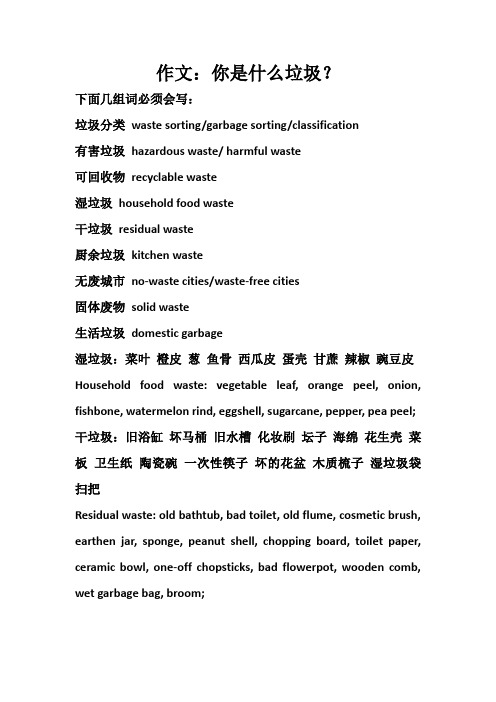
下面几组词必须会写:
垃圾分类waste sorting/garbage sorting/classification
有害垃圾hazardous waste/ harmful waste
可回收物recyclable waste
湿垃圾household food waste
干垃圾residual waste
面对日益增长的垃圾产量和日益恶化的环境,中国政府不遗余力地推行垃圾分类政策。垃圾分类是指将垃圾分为可回收和不可回收两类,要求人们对可直接用于生产有机肥、建材、燃料油、金属回收等方面的废弃物进行分类。
Compared with the traditional way of collecting waste, the new method has brought with it a variety of benefits. First and foremost, wastes are sent to different factories according to their classification rather than landfills, where they would be simply burnt and buried. What’s more, garbage classification not only cuts the spending on treating waste, but generates some handsome interest. Recyclable wastes, such as paper, glass and plastic, can be reused after being processed in related factories, while other wastes can be turned into the valuable. In a word, garbage classification is both vital and necessary to environmental protection as well as our life.
- 1、下载文档前请自行甄别文档内容的完整性,平台不提供额外的编辑、内容补充、找答案等附加服务。
- 2、"仅部分预览"的文档,不可在线预览部分如存在完整性等问题,可反馈申请退款(可完整预览的文档不适用该条件!)。
- 3、如文档侵犯您的权益,请联系客服反馈,我们会尽快为您处理(人工客服工作时间:9:00-18:30)。
Garbage recycling
Recycling is important and has became a key component in waste management. Most cities and towns have some type of recycling center. They can freely put their recyclable materials out for collection. In many places this is done free of charge. The only thing a person has to do is separate out their recyclable waste and make sure to put it in the recycling bin for collection.
If everyone can do it, small things can make a big positive impact on the environment.
For beautiful future, come on !!!
Although garbage sorting may take you a little more time, we can save our natural resources to a large extent and by doing so, we are also setting a good example to our younger generation.
Garbage sorting
Garbage
Industrial waste
House hold waste
Industrial waste
House hold waste
People are producing waste every day,which is a huge burden on th e planet's habitat.Some waste is not degradable naturally, which will exist forever, but some waste can be recycled and reused again. W aste sorting can help divide the reusable waste from the rest.
Garbage sorting and recycling
Today the quality of our natural environment has become an important issue. The world population is rising so quickly that the world has become too crowded. We are using up our natulluting our environment with dangerous chemicals. If we continue to do this, life on earth cannot survive.
Nowadays ,it is easy to find all sorts of garbage where we living, the number of garbage has exceeded the cleaning ability of our earth. When we see those picture, we must take some measures.
To reuse and recycle this kind of waste is to save resources to a large extent, which also contributes to environmental protection.
Recycling makes the world a better place. It is helping to cut down on pollution and just making this world a little greener. The best part is that everyone can do it.
